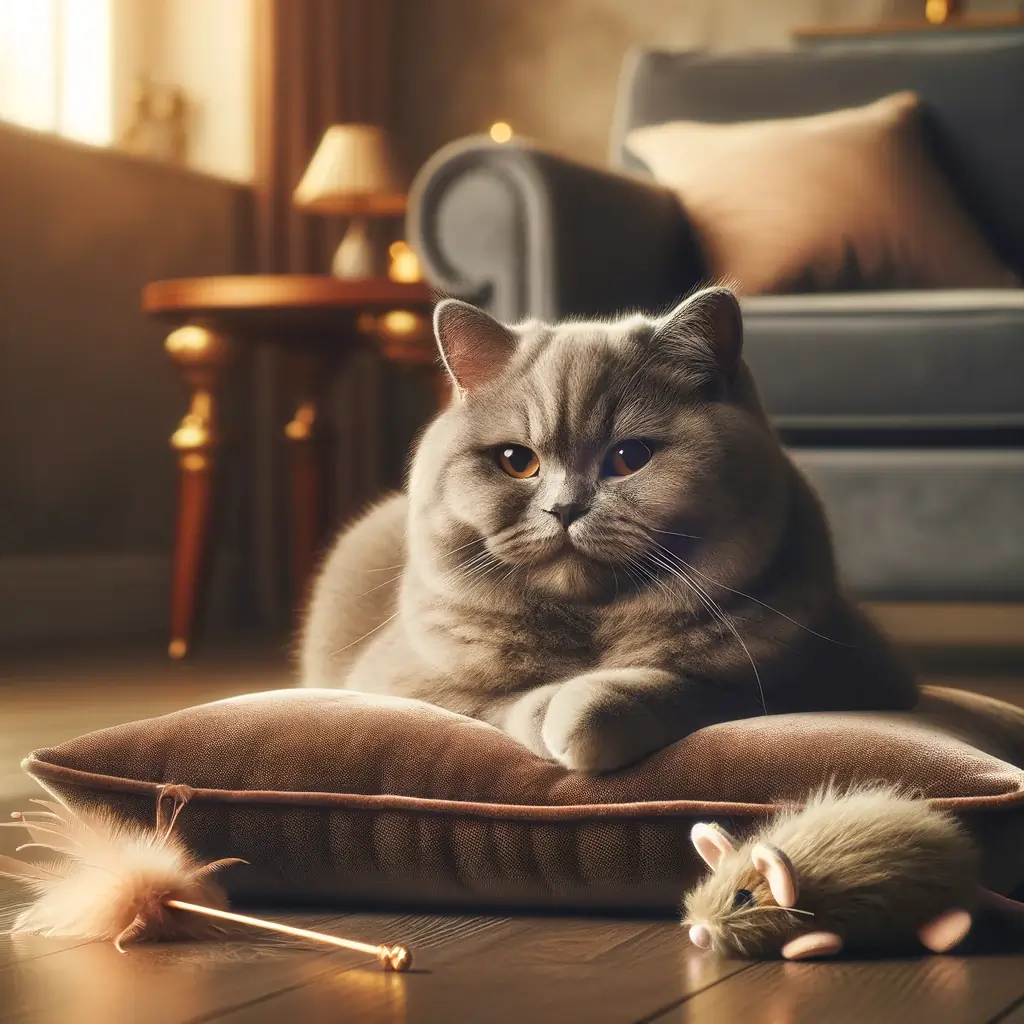In this article, we will explore the behavior of British Shorthair cats to answer the question: Do British Shorthair cats bite? British Shorthair cats are known for their gentle nature and unique feline characteristics.
Understanding their behavior and learning about their gentle nature can help us create a loving and safe environment for these adorable companions.
Key Takeaways:
- British Shorthair cats have a generally gentle nature
- They may exhibit biting behavior due to various factors such as playfulness or fear
- Socialization plays a vital role in shaping their behavior
- Preventing biting involves positive reinforcement, mental stimulation, and redirection
- A loving and stimulating environment can help ensure the well-being of British Shorthair cats
Understanding British Shorthair Cat Behavior
When it comes to understanding British Shorthair cat behavior, there are several key factors to consider. These charming felines have their unique tendencies that shape their interactions with their environment and the people around them. In this section, we will explore their behavior and shed light on common behaviors such as biting, playfulness, fear, and the vital role of socialization.
The Playfulness of British Shorthair Cats
One prominent characteristic of British Shorthair cats is their innate playfulness. They enjoy interactive playtime, which is crucial for them to fulfill their physical and mental stimulation needs. Playtime not only allows them to release excess energy but also helps build bonds with their human companions. Sometimes, in the midst of play, cats may exhibit playful biting behavior.
The Influence of Fear on Behavior
Just like any other cat breed, British Shorthairs can sometimes display fear-based behaviors. Fear can trigger defensive reactions, leading to biting or scratching. It is important to recognize and understand the underlying fear triggers to create a safe and secure environment for your British Shorthair.
The Role of Socialization
Socialization plays a crucial role in shaping the behavior of British Shorthair cats. Early socialization helps them become well-adjusted and confident in various situations and interactions. It is beneficial to expose your British Shorthair to different people, environments, and experiences from a young age. This exposure will help them develop positive associations and minimize fear-based reactions.
British Shorthair cats have a gentle and affectionate nature, making them wonderful companions. Understanding their behavior and providing the right environment and socialization will help prevent unwanted behaviors such as biting and foster a harmonious relationship.
| Behavior | Description |
|---|---|
| Biting | A natural behavior that can be associated with playfulness or fear. Proper socialization and redirecting their energy towards appropriate outlets can minimize biting tendencies. |
| Playfulness | British Shorthairs are known for their playful nature. Engaging in interactive playtime helps them release energy, build bonds, and prevent boredom-related behaviors. |
| Fear | Like any other cat, British Shorthairs can exhibit fear-based behaviors. Identifying the triggers and creating a safe environment can help alleviate fear and prevent defensive reactions. |
| Socialization | Early and consistent socialization is essential for British Shorthairs. Introducing them to various experiences, people, and environments helps build their confidence and reduces fear-related behaviors. |

Addressing Biting in British Shorthair Cats
Addressing biting behavior in British Shorthair cats is crucial for creating a harmonious and safe environment for both the cat and its human companions. By understanding the underlying causes of biting and implementing effective techniques, such as positive reinforcement, mental stimulation, and redirection, we can prevent biting incidents and foster a positive relationship with our feline friends.
Preventing Biting
Preventing biting requires a proactive approach that focuses on addressing the root causes of this behavior. Here are some tips to help prevent biting in British Shorthair cats:
- Socialization: Ensuring proper socialization from an early age is essential for British Shorthair cats. Exposing them to various people, animals, and environments can help reduce fear and aggression, which are common triggers for biting.
- Positive Reinforcement: Encouraging positive behavior through rewards and praise is an effective way to prevent biting. By rewarding cats for gentle play and using treats or affection, we can reinforce desired behaviors and discourage biting.
- Mental Stimulation: Providing mental stimulation through interactive toys, scratching posts, and puzzles helps keep cats engaged and focused. Boredom and pent-up energy can lead to biting as a means of release, so keeping our furry friends mentally stimulated is key.
- Redirection: Redirecting a cat’s biting behavior towards appropriate outlets is crucial. Providing toys specifically designed for biting and scratching, or engaging in interactive play sessions, can redirect their energy and prevent them from using their teeth and claws on us or our belongings.
Understanding the Underlying Causes
It’s essential to identify the underlying causes that may contribute to biting behavior in British Shorthair cats. Some common underlying causes include:
- Fear or anxiety: Cats may bite when they feel threatened, scared, or anxious. Identifying and addressing the source of their fear or anxiety can help alleviate biting behavior.
- Playfulness: British Shorthair cats are known for being playful, and sometimes their playfulness can escalate into biting. Providing appropriate toys and playtime can help redirect their play behavior and prevent biting incidents.
- Health Issues: Certain health conditions, such as dental pain or discomfort, can contribute to biting behavior. Regular veterinary check-ups and addressing any underlying health issues are crucial for preventing biting.
Conclusion
In conclusion, we have explored the behavior of British Shorthair cats and provided insights into their biting tendencies. While British Shorthair cats are generally known for their gentle nature, it is important to understand that biting can occur due to various reasons.
By addressing the underlying causes of biting, such as fear or playfulness, and implementing appropriate prevention strategies, we can create a harmonious environment for British Shorthair cats and their owners. Positive reinforcement techniques, coupled with mental stimulation and redirection, can help discourage biting behaviors and encourage desirable actions.
Creating a loving and stimulating environment is crucial for British Shorthair cats to thrive and develop into well-behaved feline companions. By providing them with proper care, socialization, and outlets for their natural instincts, we can enhance their overall behavior and prevent biting incidents.
FAQs
Q: Do British Shorthair Cats Bite?
A: Yes, like any other cat, British Shorthair cats have the potential to bite. However, they are known for their gentle and docile nature, so biting is not typically a common behavior for them.
Q: How to address the issue if my British Shorthair cat is biting?
A: If your British Shorthair cat is biting, it’s important to understand the cause of the behavior. It could be due to feeling threatened, stressed, or provoked. It’s essential to address the issue calmly and provide your cat with a calm and affectionate environment.
Q: Are British Shorthair cats prone to biting more than other breeds?
A: British Shorthair cats are known for their laid-back and affectionate temperament, so they are not typically prone to biting more than other breeds. However, every cat is unique, and some may resort to biting if they feel threatened or scared.
Q: What should I do if my British Shorthair kitten starts biting?
A: If your British Shorthair kitten starts biting, it’s important to address the behavior early on. Provide your kitten with plenty of toys to play with, redirection, and positive reinforcement to encourage appropriate behavior.
Q: Can licking lead to biting in British Shorthair cats?
A: While licking is a common behavior for cats, it may escalate to biting if the cat feels overstimulated or uncomfortable. It’s important to pay attention to your cat’s body language and signs of distress to prevent any potential biting.
Q: When should I seek professional help for my British Shorthair cat’s biting behavior?
A: If your British Shorthair cat’s biting behavior is persistent, aggressive, or causing harm to people or pets, it’s recommended to seek assistance from a veterinarian or animal behaviorist. They can help identify the root cause of the behavior and provide guidance on how to manage it.
Q: Are older British Shorthair cats more likely to bite?
A: Older British Shorthair cats are generally calmer and more settled in their behavior compared to younger cats. Biting in older cats could be a sign of underlying health issues, so it’s important to monitor their behavior and seek veterinary advice if necessary.
